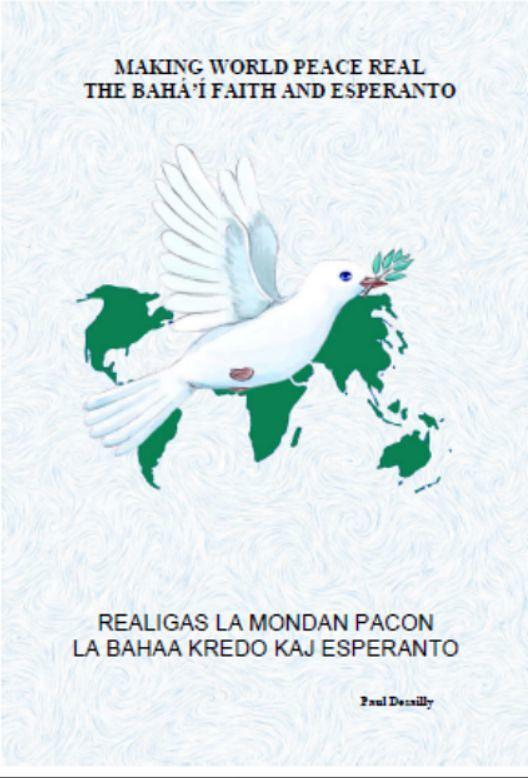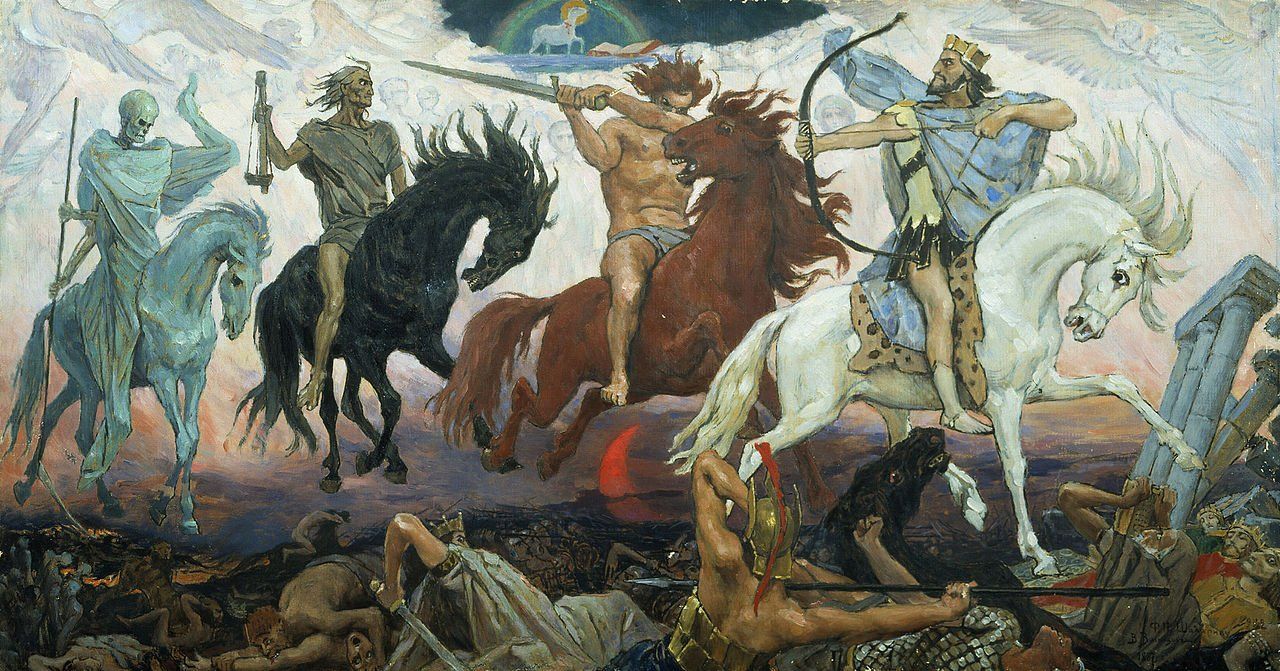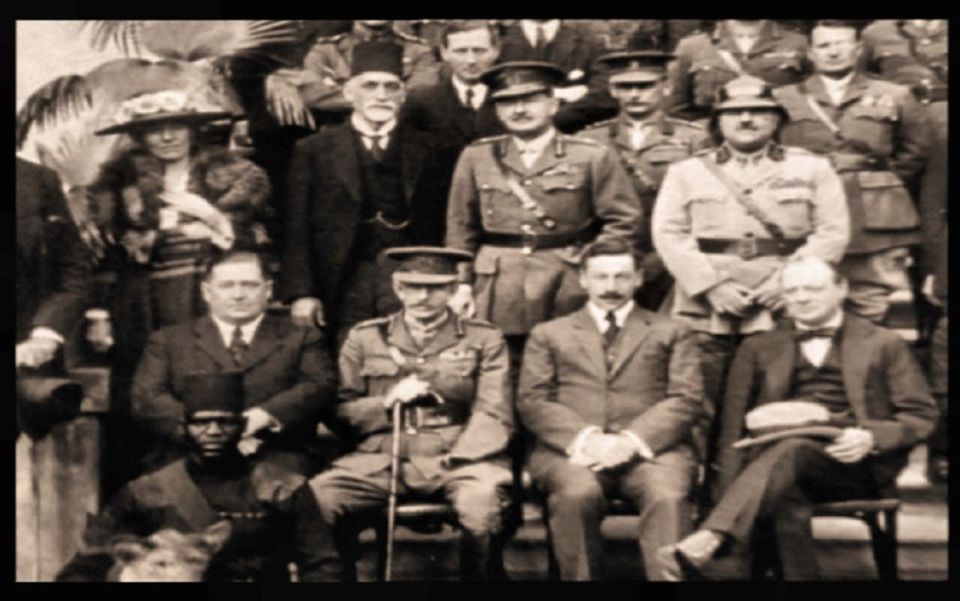Churchill & Esperanto. Bahais & Esperantists 2 lingva invito
Dulingva invito al bahaanoj & esperantistoj. An invitation in English & Esperanto to Baha’is & Esperantists
https://en.wikipedia.org/wiki/Cairo_Conference_(1921) https://www.cliohistory.org/thomas-lawrence/cairo
Historia foto en Kairo montras la fascinan multlingvulon kaj multesciulon, Gertrude Bell, (1868-1926), kune kun ŝia estro, Winston Churchill, ĉapelon ĉe-mane. (Vd: Reĝino de la Dezerto, filmo (Queen of the Desert), Nicole Kidman, 2015). Li difinas diplomation kaj takton jene: “Diplomatio estas la arto rakonti al homoj iri al infero tiel ke ili petas direktojn.” “Takto estas la kapablo diri ke ili iru al infero tiel ke ili atendas kun ĝojo al la vojaĝo.” DANKON!
Diplomatio estas impotenta: http://aea.esperanto.org.au/ftp-uploads/ESK-125-dec2016.pdf p.17-22 Diplomacy is impotent: https://gumroad.com/l/TbtCp From Babel to Baha’i p.35.
This historic photo in Cairo depicts the fascinating polyglot-polymath Gertrude Bell (1868-1926) (Queen of the Desert, 2015) with her boss seated, a youngish Winston Churchill (1874-1965) hat on lap; he defined diplomacy and tact thus: “Diplomacy is the art of telling people to go to hell in such a way that they ask for directions.” “Tact is the ability to tell someone to go to hell in such a way that they look forward to the trip.” MERCI!
“La hebrea ne fariĝos oficiala lingvo en Trans-Jordanio.” Sir Winston Churchill, Kairo, 1921 “Hebrew would not be made an official language in Trans-Jordan.” W Churchill, Cairo, 1921
“Antaŭ kelkaj monatoj mi konvinkis la Britan Ministraron starigi ministran komitaton por pristudi la Basic English kaj raporti pri ĝi… Kia ĝojo kiam, la alian vesperon, tute neatendite, mi aŭdis la prezidanton de Usono subite priparoli meritojn de Basic English. Estas hazardo, konsiderante tion, ĉu ne, ke mi nun alvenas al la Universitato de Harvard…” W. Churchill. 1943.
“Some months ago I persuaded the British Cabinet to set up a committee of Ministers to study and report upon Basic English… What was my delight when, the other evening, quite unexpectedly, I heard the President of the United States suddenly speak of the merits of Basic English, and is it not a coincidence that, with all this in mind, I should arrive at Harvard…”
https://www.bandeeducation.com/a-challenge-and-an-opportunity The Oxford Dictionary defines a coincidence: “A concurrence of events or circumstances without apparent causal connection.”
Ĉu Zamenhof vere mortis? Kaj kio pri Ĉerĉil [Churchill]? https://eo.wikipedia.org/wiki/Winston_Churchill Renato Corsetti. ESK, junio 2020, paĝoj 17-20. (Arkivigota.) Angligis: P Desailly: https://www.bandeeducation.com/a-challenge-and-an-opportunity
Danke al spertaj lingvistoj en Aŭstralio, Belgio, Britio, Germanio, Nederlando, Nov-Zelando, kaj Rusio modelstile en bonkvalitaj revuoj aperis lastatempe deko da bahatemaj artikoloj por miloj da legantoj de la zamenhofa lingvo tra la mondo. La koncernaj artikoloj ĉi sube listigitaj ankaŭ celas esperantistigi la ses milionan bahaanaron. Tiucele mi senpage kaj senkopirajte ĉi ĉion disponigas ankaŭ anglalingve. Finfine malmankas nun materialo je la dispono de la esperantistaro en facile navigebla elektronik-arkivo de Esperanto sub la Suda Kruco (ESK), en Almanako Lorenz, Monato, Sennaciulo kaj La Ondo de Eo. Bonvolu do geamikoj ne heziti por laŭplaĉe proponi ideojn por asisti bahaanojn Esperantistiĝi!
Thanks to talented editors and linguists in Australia, Belgium, Britain, Germany, Holland, New Zealand and Russia a dozen Baha’i nuanced articles appeared recently in five high-quality reviews read by thousands of Esperantists in 120 countries. Said articles archived in Esperanto sub la Suda Kruco seek also to Esperantize Bahá'í friends! To that end, English translations of all this are available copyright and fee free. Please feel free to propose ideas for helping Bahá'ís to become Esperantists ASAP!
TABELO DE JAM APERINTAJ VERKOJ, ARTIKOLOJ, ANONCOJ, REKLAMOJ, KTP KIES TEMOJ RILATAS AL BAHAISMO KAJ ESPERANTIGO DE LA BAHAANARO.
A LIST OF BAHA’I RELATED WORKS AND ARTICLES AIRED IN THE ESPERANTO MEDIA URGING BAHA’IS TO REALLY CONSULT ON THE AUXLANG PRINCIPLE.
https://www.yumpu.com/es/document/read/10266523/realigas-la-mondan-pacon-la-bahaa-kredo-kaj-esperanto * https://katalogo.uea.org/katalogo.php?inf=6655
Realigas la Mondan Pacon – La Bahaa Kredo kaj Esperanto. Paŭlo Jozefo Desailly. Making World Peace Real – The Baha’i Faith and Esperanto https://gumroad.com/l/making_world_peace_real/
Baha-temaj artikoloj aperintaj en ‘La Ondo’, ‘Esperanto sub la Suda Kruco’, ‘Monato’ ‘Almanako Lorenz’:
NIA TREZORO – ABDUL BAHA https://sezonoj.ru/2014/01/abdul-baha/ (33 respondoj!)
Kia Diferenco inter Filozofio kaj Religio!? What a Difference between Philosophy and Religion! What is the Difference between Philosophy and Religion?
Junio 2016, paĝoj 9 - 12: http://aea.esperanto.org.au/ftp-uploads/ESK-123-jun2016.pdf
See: PROOF – FOR THE LAYPERSON https://gumroad.com/l/RRSCR pages 40 - 54. $3.00
Ateismo Nun Maldefendebla Atheism is Untenable: https://gumroad.com/l/RRSCR pp. 11, 19 & 33.
Septembro 2016, paĝoj 28 - 30: http://aea.esperanto.org.au/ftp-uploads/ESK-124-sep2016.pdf
Diplomatio estas Senpova: Problemoj ĉe la Ligo de Nacioj samas ĉe UN nun. (Elektis mi la vorton Impotenta.)
Decembro 2016, paĝoj 17 - 22: http://aea.esperanto.org.au/ftp-uploads/ESK-125-dec2016.pdf
Diplomacy is Impotent says Abdul Baha: Problems at the League of Nations Persist at the United Nations Now See: FROM BABEL TO BAHA’I - part 2 https://gumroad.com/l/TbtCp pages 32-44. $5:00.
Poeziece Esperanto Venkas Poetically Esperanto Conquers - Lotus Temple
Marto 2017, paĝoj 19 - 22: http://aea.esperanto.org.au/ftp-uploads/ESK-126-mar2017.pdf
Poeziece Esperanto Venkas - parto du. paĝoj 24 - 26. https://gum.co/gDehr p. 128 - 140.
Junio 2017: http://aea.esperanto.org.au/ftp-uploads/ESK-127-jun2017.pdf
Honore al Lidia Zamenhof, p.16 - 17. In Honor of Lidia Zamenhof - gassed 1942 (British Library):
Konsultado kaj Obeado, parto1 Consultation and Obedience, part 1: https://gumroad.com/l/TbtCp p. 24 - 28. Septembro 2017, paĝoj 21-24: http://aea.esperanto.org.au/ftp-uploads/ESK-128-sep2017.pdf
Konsultado kaj Obeado, parto 2 Consultation and Obedience, part 2: https://gumroad.com/l/TbtCp pp. 29 - 31
Decembro 2017. paĝoj 26 - 28: http://aea.esperanto.org.au/ftp-uploads/ESK-129-dec2017.pdf
En la sama eldono aperas respektive sur paĝoj 9 - 10 kaj 29 - 30 artikolo de Katja Steele verkita pri bahaanino, Julie Lois Regal (1920 - 2017), kaj du leteroj de parlamentano de Sud-aŭstralio (Katrine Hildyard M.P.) en kiu, responde al iniciato de bahaano, ŝi oficiale rekomendas Esperanton al la Ministro pri Edukado (Susan Close M.P.)
See in the same edition, respectively on pages 9-10 and 29-30, an article by Katja Steele about the Baha’i pioneer Julie Lois Regal (1920-2017) and two letters from the South Australian parliamentarian (Katrine Hildyard M.P.) in which, in response to a Baha’i initiative, she officially recommends Esperanto to the Minister of Education.
Lingvaj Humuraĵoj (religi-devenaj) p12-14; La diferenco inter la bahaa kredo kaj aliaj mondaj religioj. p.18-21
http://aea.esperanto.org.au/ftp-uploads/ESK-130-mar2018.pdf
A JOKE OR TWO WITH A RELIGIOUS CONNOTATION – KEEP YOUR HAIR SHIRT ON: https://gum.co/gDehr p141-144 Distinctions between the Bahá’í Faith and other World Religions: https://gum.co/gDehr p. 89-91 p109-113. https://gumroad.com/l/TbtCp p.55 (BBC)
La Interna Ideo The Internal Idea of Esperanto (* pp.24-26) https://gumroad.com/l/TbtCp pages 60 – 69 and 92 – 95.
Junio 2018, paĝoj 23 - 25: http://aea.esperanto.org.au/ftp-uploads/ESK-131-jun2018.pdf Samloke:
Eddie Chen-Desailly Piknikas ‘kun’ Sir Douglas Mawson; Doug Everingham forpasis. (P. Danzer), p. 16 - 19.
Esperanto: Universala helplingvo (Surprize granda rolo de religiaj organizaĵoj en UEA https://en.wikipedia.org/wiki/Universal_Esperanto_Association
Marto 2019, paĝoj 28 - 30: http://aea.esperanto.org.au/ftp-uploads/ESK-134-mar2019.pdf
Esperanto: A universal auxlang (Many religious organisations represented in Esperanto Land: https://gumroad.com/l/TbtCp p.60-64)
La Esperanto-movado en Ĉinio kaj Japanio The Esperanto movement in China and Japan https://gumroad.com/l/TbtCp p.65-73
Decembro 2019, paĝoj 16 - 18: (arkivigota en ‘Esperanto sub la Suda Kruco)
‘ALMANAKO LORENZ 2017’: Poeziece Esperanto Venkas: paĝoj 157 - 165 (abundas referencoj al bahaismo)
‘ALMANAKO LORENZ 2018’: Poeziece Esperanto Venkas - parto du: paĝoj 77 - 88 (iome aludas bahaismon)
‘ALMANAKO LORENZ 2019’: ESPERANTO UNIVERSALA HELP-LINGVO: paĝoj 163 - 166.
(Referencas iome al bahaismo kune kun multaj organizaĵoj filozofiaj kaj religiaj; similaj artikoloj aperas en ESK kiel supre.)
‘ALMANAKO LORENZ 2020’ kaj ‘SENNACIULO 2020 7/8, http://satesperanto.org/spip.php?rubrique709: PREZIDENTOJ TRUMP KAJ XI NEGOCAS PRI LA ANGLA LINGVO KORPORIGITA Vidu respektive paĝojn ??? kaj 27. PRESIDENTS TRUMP AND XI: TRADE OFF ON CORPORATE ENGLISH https://www.bandeeducation.com/trump-xi
‘Recenzo’ mia (2019) de Meditadoj EL LA ANIMO de Paiva Netto (2011): https://katalogo.uea.org/katalogo.php?inf=8704&id=1694&recenzo=montru#ek
CHURCHILL AND ESPERANTO: https://www.bandeeducation.com/a-challenge-and-an-opportunity
Ĉerĉil kaj Esperanto: Esperanto sub la Suda Kruco, paĝoj 17 - 20. Junio, 2020 (arkivigota)
‘MONATO’ - Oktobro kaj novembro 2020: KIU KATEGORIO PLI RESPONDECAS PRI STAGNADO DE NOVALIGHO AL BAHAISMO DUM LA LASTAJ 35 JAROJ
Who is responsible for retarding Baha’i enrolments since 1985? https://www.bandeeducation.com/bahais-esperantists
‘ALMANAKO LORENZ 2021': (jam aprobita de F V Lorenz por 2021)
Ateismo, historia materiismo, religio, spiritismo, spiritualismo, evoluado, la unua leĝo de termodinamiko.
https://www.bandeeducation.com/spirit-of-things-4-page-promo https://www.bandeeducation.com/spirit-of-things-2-page-promo
Diversaj raportoj miaj aperis en La BELmonda Letero https://eo.wikipedia.org/wiki/Bahaa_Esperanto-Ligo kaj aliloke en lastaj 30 jaroj.
ENHAVO
Renato Corsetti
La angla kaj Esperanto Ĉu Zamenhof vere mortis? Kaj kio pri Ĉerĉil [Churchill]? paĝoj 5 - 9
https://en.wikipedia.org/wiki/Renato_Corsetti
CONTENTS
CHURCHILL AND ESPERANTO
Is Doctor Zamenhof really dead? And what about Churchill? – pages 10 - 14
Translated from Professor Renato Corsetti’s original essay in Esperanto by P. J. Desailly, Adelaide, Australia.
Invito al ĉiu individua bahaano enketi serioze pri la zamenhofa lingvo de la monda paco - paĝoj 15-16 An invitation to all Baha’is, as individual believers, to seriously investigate Dr Zamenhof’s language of world peace.
La koncerna paĝaro www.bandeeducation.com The website in question.
Renato Corsetti: Ĉu Zamenhof vere mortis? Kaj kio pri Ĉerĉil [Churchill]?
Certe ili ambaŭ mortis sed ne iliaj ideoj, kiuj daŭre produktas efikojn. La ideoj de Zamenhof estas resumeblaj per egaleco inter ĉiuj popoloj. La ideoj de Ĉerĉil estas resumeblaj per la ideoj de la libera merkatismo. Ĉi tiu artikolo esploras pri la malhelpoj al Esperanto en la merkatliberismaj ekonomioj. Ne temas pri persekutoj kontraŭ danĝera lingvo sed pri malhelpoj kontraŭ lingvo kaj ideo kontraŭa rilate al la mondordo, kiun ili celas. Tiuj malhelpoj ĉefe konkretiĝas per antaŭenigo de alternativa projekto. Mia centra tezo estas, ke la malhelpoj al Esperanto fare de Francujo kaj poste de la anglalingva mondo estis pli efikaj kontraŭ Esperanto ol la abomenaj persekutoj kontraŭ homoj fare de naciismaj registaroj.
1. En la 19-a jarcento: Rasaj ideoj kaj imperiismo
Oni scias, ke la 19-a jarcento, la naskiĝ-jarcento de Esperanto, estis jarcento de firmigo kaj ĝeneraligo de la konceptoj pri naciaj ŝtatoj en la kontinenta Eŭropo. Tiu estis ĝenerala pensofluo, kiu influis ĉiujn en tiu epoko, inkluzive de homoj, kiel Zamenhof, kiu tamen favoris la malon, tio estas la disfalo de la "obstinaj baroj inter la popoloj dividitaj".
Kompreneble Zamenhof estis unu el tiuj homoj, kiuj ja sukcesas eskapi el la idea ĉirkaŭaĵo de sia epoko. Lastatempa artikolo de islanda esploristo eĉ prezentas Esperanton kiel unu el la movadoj por kontraŭi la nacian movadon de la 19-a jarcento.
En tiu sama periodo en aliaj landoj kaj en kontinenta Eŭropo kaj en Britujo kaj iugrade en Usono la ĝenerala publika pensofluo estis konstruanta tute alispecan vidon pri la mondo, en kiu ne superregis ideoj pri frateco kaj interfratiĝo, sed ideoj pri rego fare de la blankuloj de la cetera mondo. Tiuj ideoj estis prezentitaj tiel malkaŝe, ke nun estas malfacile eĉ akcepti, ke la situacio estis tia kaj tiel kontraŭesperantisma en la faktoj. Temis evidente pri imperiismo, kiel lasta stadio de kapitalismo laŭ la esprimo de Lenin.
Kiam temas pri Britujo, la 19-a jarcento estas konata kiel la jarcento de la fina konstruado de la brita imperio. Nenio pli ol la asertoj de publikaj figuroj tre influaj de tiu periodo povas klarigi la specon de etoso tiam reganta. Ni komencas per Sesil Rodz [Cecil Rhodes], ege influa homo en Britujo dum la dua duono de la 19-a jarcento (Cetere laŭ li la lando Rhodesia ricevis sian nomon.)
"Rhodes pensis pri sekreta elito de anglaj-saksaj homoj dediĉitaj, kiel la filozofiistoj de Platono, porti aŭtoritaton kaj ordon al la tuta mondo, kiuj regos aliajn popolojn por ilia bono mem. Ĉi tiuj dediĉitaj junaj homoj devis esti eltiritaj el Britujo, Norda Ameriko kaj Germanujo, ĉar Rhodes rigardis tiujn landojn ne nur kiel vere blankaj sed ankaŭ destinitaj por mondo-regado. ", kiel diras biografio pri li. Sed ne temis nur pri li. Temis pri ĉiuj. Ekzemple Ĝon Raskin [John Ruskin], la plej alte taksata artisto de la 19-a jarcento en Britujo, diris en sia inaŭgura parolado en Oksfordo: "Estas nun destino ebla por ni, la plej alta iam ajn metita antaŭ nacio, kiun ni povas akcepti aŭ rifuzi. Ni estas ankoraŭ nedegenerita raso, raso miksita de la plej pura norda sango...Anglujo...devas fondi koloniojn kiel eble plej vaste..."
Klare ĉiuj planoj de Rhodes, de la brita registaro kaj de aliaj koncernatoj en Britujo konsideris kiel lingvon de la estonta imperio nur la anglan. Nenio alia esti eĉ pensebla. Revoj pri egaleco kiel tiuj kunligitaj kun Esperanto tute ne trovis lokon en la rasisma-imperiisma sinteno de la epoko, en kiu Esperanto naskiĝis.
Sed kompreneble en tiu periodo tia sinteno ne nur regis en Britujo. Ni devas almenaŭ ekzameni la imperiismajn ideojn en Francujo.
En Francujo ni havas ankaŭ formalan daton pri la naskiĝo de la imperio post la revolucio, Temas pri la 18-a de majo 1804, dato de la deklaro de Napoleono imperiestro de la francoj.
La sekvoj de ĉi tiu imperio estas bone konataj. Malpli konataj estas la sekvoj kulturaj kaj lingvaj. La francoj, kiel ĉiuj imperiistoj, klopodis disvastigi la francan kulturon kaj la francan lingvon. La disvastigo de la lerneja sistemo laŭ la principoj de la revolucio helpis pri tio. Ekzemple per dekreto de la 4-a de julio 1810 en la konkeritaj slavaj teritorioj ĉiuj komunumoj devas havi lernejon por knaboj kaj ĉiu distrikto devas havi lernejon por knabinoj. Pluraj liceoj, superaj lernejoj, estas antaŭviditaj kun la instrulingvo nur franca. Multaj ilirianoj estas sendataj al la universitatoj en Francujo.
En la dua duono de la jarcento dum la tiel nomata dua imperio la kolonia puŝo de Francujo intensiĝas. Finfine la kolonia franca imperio, kies surfaco estis malpli granda ol 300.000 kvadrataj kilomentroj en 1851, havos surfacon de pli ol 1.000.000 kvadrataj kilomentroj en 1870.
Kompreneble francoj estis pli rigoraj pri la apliko de siaj konceptoj en la kolonioj, kaj la franca iĝis la lingvo devige instruata en ĉiuj lernejoj de la francaj kolonioj, dum angloj ne agis en tiu maniero sed fidis je sia forto por enkonduki la anglan. La franca ĉiouokaze estas prioritate instruata al la infanoj de la lokaj elitoj aŭ de la tribestroj.
Kompreneble malantaŭ tio estis la rasismaj ideoj, kiuj floris en la dua duono de la 19-a jarcento precipe en Francujo. Artur Degobino [Arthur de Gobineau] (1816-1882) disvastigis la ideon en Essais sur l'inegalite' des races humaines [Eseo pri la malegaleco de homaj rasoj] de 1855, ke la raso hinda-europa estis la prapatro de ĉiuj estraj klasoj de Europo, kaj aparte de la francaj nobeloj (al kiu li apertenis). https://eo.wikipedia.org/wiki/Arthur_de_Gobineau
Apartan situacion ni trovas en tiu periodo en Usono. Certe ankaŭ tie ekzistis ideoj pri supereco de blankuloj, kiel la rilatoj al la nigruloj ĵus liberigitaj el sklaveco pruvas, sen bezono pri literaturaj citaĵoj, sed la konstruado de usona imperio en la fino de la 19-a jarcento estis nur en sia komenca stadio, kaj pro tio ni povas preteratenti tiun landon nun.
Kiel ni scias Esperanto naskiĝis en Orienta Eŭropo kaj disvastiĝis tie kaj poste en Okcidenta Eŭropo. Pri Britujo esencan rolon ludis tiu sama W. T. Sted [Stead] Efektive W. T. Stead, estis tre malkonformisma homo, kiu subtenis multajn kaŭzojn, estis en malliberejo pro artikoloj kontraŭ prostituiteco en Britujo, ktp.
Same en Francujo la akcepto de Esperanto okazis fare de individuoj ne influataj de la ĝenerala 'kontraŭesperanta' mondorigardo.
2. En la Societo de Nacioj – la unua vera persekuto de Esperanto
La agado por Esperanto ĝuis belan periodon en la komenco de la 20-a jarcento ĝis la unua mondmilito. Ne necesas citi apartajn verkojn pri tio. Ĝenerale konataj estas la unua monda kongreso en Bulonjo-ĉe-maro en 1905 la postaj kongresoj interalie en Britujo kaj eĉ en Usono en 1910 kaj la fondo de Esperanto-grupoj tra la tuta Eŭropo kaj parte tra la mondo.
Post la interrompo pro la granda milito en Eŭropo la agado por Esperanto reprenis kun granda energio, sed tiam la Esperanto-movado ricevis la unuan seriozan baton. Ĉi-foje la persekutanto estis Francujo.
Je la fino de la unua mondmilito, kunlige kun la packonferenco en Versajlo [Versailles] en la jaroj 1919-1920 oni fondis la Societon de Nacioj, oficiale la 28-an de junio 1919. Temis pri la unua versio de internacia organizaĵo por solvi internaciajn problemojn kaj eviti militojn.
Jam en la posta jaro, la 19-an de decembro 1920, 11 delegitoj prezentis proponon pri rezolucio pri Esperanto. Malantaŭ la propono estis la agado de la jura konsilanto de la persa delegito, la poste tre fama esperantisto Edmond Privat. La reago de la franca delegito estis tre malfavora. Bonvolu konsideri nur la jenajn vortojn: "Jam ekzistas internacia lingvo: la franca, universale instruata ĉie en la mondo de la penso." Tiu franca delegito estis grava franca politikisto, iama ministro pri eksterlandaj aferoj, kiu, kiel la ministro pri publika instruado Léon Bérard, timis la konkurencon de Esperanto al la rolo de internacia lingvo, kiun tiam havis la franca. La ministro eĉ malpermesis la instruadon de Esperanto en ejoj apartenantaj al la francaj lernejoj. Ili evidente ne perceptis, ke la rolo de la franca jam estis minacata de la angla. Ĉiuokaze la propono estis forŝovita al la Ĝenerala Konferenco de la posta jaro.
Malgraŭ la favora raporto de la Ĝenerala Vic-sekretario Inazo Nitobe, kiu vizitis la tiujaran Universalan Kongreson en Prago, kaj malgraŭ la subteno de 13 delegitoj: Suda Afriko, Rumanujo, Persujo, Belgujo, Ĉeĥoslovakujo, Kolombio, Ĉinujo, Finlando, Albanujo, Japanujo, Venezuelo, Hindujo kaj Pollando (kun kelkaj kondiĉoj). Pro la daŭra kontraŭstaro de Francujo oni akceptis la raporton sed sendis al la Internacia Komitato por Intelekta Kunlaborado la ŝlosilan parton, tio estas la rekomendo pri instruado de Esperanto en la lernejoj de la membraj ŝtatoj.
Tie la franca reprezentanto Rejnald [Reynald] deklaris, ke li ricevis instrukciojn malaprobi la proponon, kaj tio finis la debaton. Iusence la francoj sukcesis haltigi Esperanton en ties plej bona momento, kiun oni poste neniam plu reatingis pro la naciismaj kaj naziaj registaroj en Eŭropo, la dua mondmilito, la malvarma milito, la rolo de la angla, ktp.
3. Ceteraj okazaĵoj en la sama periodo en anglalingvaj landoj
Se la francoj ne rimarkis ke la angla komencis okupi poziciojn en la areno de internaciaj lingvoj, la angloj pluiris laŭ siaj ‘imperiaj’ ideoj ankaŭ post la unua mondmilito. Kiam mi diras “la angloj” tio devas esti komprenata kiel la reganta angla elito kaj la konservema parto de la publika opinio.
En la dudeka jarcento la pure rasismaj konsideroj de la antaŭa jarcento estas forlasitaj sed ne la ideoj pri la supereco de la angla civilizo.
Ideojn pri tiu supereco havis C K Ogden. En 1925 li produktis sian Basic English (Baza angla), plene priskribita en libro aperinta en 1930. Temis pri ideo disvastigi en pli facila maniero la konon de la angla lingvo al ĉiuj. Ogden estis konvinkita, ke la mondo bezonas malaperigi malgrandajn lingvojn laŭgrade kaj uzi laŭeble nur unu, la anglan en formo simpla aŭ kompleta.
La afero estis vaste konata en Britujo kaj laŭdata kiel maniero alproprigi la anglan al tiuj bedaŭrinduloj, kiuj ne posedas ĝin denaske. Vaste konata libro de 1933 pri tio estas la libro “The Shape of Things to Come” de H. G. Ŭelz [Wells].
Temas pri scienc-fikcia verko pri la historio ĝis la jaro 2016. En tiu verko Basic English estas la interlingvo de la estonta mondo, mondo en kiu post longaj bataloj tutmonda aŭtoritata registaro sukcesas unuigi la homaron kaj devigi ĉiujn lerni tiun lingvon kiel duan lingvon.
Ĝoĝ Orŭel [George Orwell] estis unu el la subtenantoj de Basic English ĝis 1945, kiam li iĝis kritika pri ĉiuj internaciaj lingvoj. Sed tio, kio plej impresas, estas ke la projekto Basic English estis aparte atentata, eĉ dum la dua mondmilito, de la brita registaro, kiu evidente vidis en ĝi ilon por disvastigi la anglan lingvon kaj kulturon.
En 1943 Ŭinston Ĉerĉil [Winston Churchill] faris faman paroladon en la universitato de Harvard okaze de la ricevo de honora titolo. Tiu parolado estas ofte citata pro la peceto kiu sekvas (nia traduko kaj nia aldonita emfazo): “Ni antaŭeniru kiel pri aliaj demandoj kaj pri aliaj decidoj similaj laŭ celo kaj efiko – ni antaŭeniru sen malbono al iu ajn kaj kun bona volo al ĉiuj. Tiaj planoj ofertas tre pli bonajn kompensojn ol forpreni provincojn aŭ landojn de aliaj popoloj aŭ ekspluate subtreti ilin. La imperioj de la estonta tempo estos la imperioj de la menso....Antaŭ kelkaj monatoj mi konvinkis la Britan Ministraron starigi ministran komitaton por pristudi la Basic English kaj raporti pri ĝi. Jen konkreta plano.” Tiu plano sonoras, laŭ mi, kiel la mortosonorilo por la Esperanto-movado, sen bezono pri persekutado de esperantistoj sed per simpla superforto per plano, kiu celas la malon kaj kiu estas apogata de la registara potenco de Britujo kaj Usono. Mi kutimas je la diro “ni ne estas malamikoj de la angla” respondi:”Bone. Sed la angla en la realo estas malamiko de Esperanto, se ĝi celas transpreni la rolon de Esperanto kiel monda interlingvo”. Tion klare diris Churchill en tiu parolado.
Intertempe ekestis ankaŭ la British Council, la oficiala organo por zorgi pri la angla eskterlande. En 1934 funkciuloj de la Ministerio pri Eksterlandaj Aferoj de Britujo kreis la “British Committee for Relations with Other Countries”. La nomo estis poste mallongigita en 1936 al British Council.
4. En la dua duono de la 20-a jarcento
La historio de tio, kio okazis en ĉi tiu periodo estas konata kaj bone dokumentita en la libro de Robert Phillipson, Linguistic Imperialism. En la lastaj 25 jaroj tiu libro estis kritikita el pluraj flankoj, sed neniu neas la imperiismajn agojn kaj faktojn prezentitajn. Oni simple interpretas ilin el alia vidpunkto, klarigante ke ne estis la anglalingvaj landoj, kiuj devigis la aliajn lerni la anglan, sed temis esence pri libera elekto de la aliaj landoj mem por sia propra avantaĝo.
Nenio esence nova el la teoria vidpunkto okazis ek de la jaro 1950, sed nur praktika realigo de la jam esprimitaj ideoj.
Sed kiel ni diris en la komenco okazis ĉefe daŭra aplikado de la agado en ĉi tiu kampo. Ĉiuj landoj, krom la komunismaj landoj, troviĝis, kiel diris ŝerce meksika ŝtatprezidanto pri Meksiko “malproksimaj de Dio kaj proksimaj de Usono.” Mi devas ankaŭ diri, ke kun tre malmultaj esceptoj la regantoj de la aliaj landoj aktive kunlaboris. Oni notis nur la nekunlaboron de la francoj, kiuj provis ankoraŭ teni la francan kiel internacian lingvon.
La rezulto de ĉi tiu agado estas jam sub la okuloj de ĉiuj. La angla estas instruata ĉie en la mondo kaj ĝi transprenas laŭgrade la rolon de interlingvo, pri kiu revis Zamenhof rilate al Esperanto. Nun la esprimo en la angla estas ‘lingua franca’.
La agado de la Organizaĵo de Unuiĝintaj Nacioj en ĉi tiu kampo neniam atingis la punkton de tiu ĉe la Societo de Nacioj kaj la lingvaj rajtoj neniam estis akceptitaj kiel homaj rajtoj, malgraŭ la mencio pri lingvo en la artikolo 2. Ekzistas nur unu studo realigita pro peto de UN pri diskriminacioj surbaze de interalie lingvo. La studo agnoskas, ke tiaj diskriminacioj ekzistas, sed neniu praktika paŝo estis entreprenata.
Do anglalingvaj landoj eĉ ne devis uzi sian vetoo-rajton por malhelpi diskutadon pri Esperanto, ĉar neniam oni alvenis al tiu diskutado.
Ĉu la persekutoj de Hitler kaj Stalin en la fino estis pli danĝeraj al la ideo de internacia, neŭtrala planlingvo ol la nepersekuto sed zorgado pri alternativa projekto anoncita de Churchill?
5. Realisma konkludo
Ĝis nun mi montris kiel en la kampo de instalado en la mondo de interlingvo inter homoj apartenantaj al malsamaj lingvogrupoj la projekto Esperanto malsukcesis kaj la projekto “angla lingvo kiel dua lingvo por ĉiuj” sukcesis.
La Esperanto-movado nuntempe ankoraŭ ekzistas kaj laboras por Esperanto, sed ĝi estas la ombro de tio, kio ĝi estis en la komenco de la pasinta jarcento, kiam temas pri publika agnosko. “Ĉu Esperanto ne jam formortis?” Tion demandas de vi parto de la homoj, kiuj iam aŭdis pri ĝi. La alia parto ne demandas, ĉar ili neniam aŭdis pri ĝi.
Esperanto disvastiĝis tutmonde sed restas tre marĝena fenomeno. Ĝi adaptiĝis al la novaj retaj komunikeblecoj kaj iom reviviĝis pro la interreto, kiu donas al individuoj la potencon komuniki.
Certe la ideo pri justa kaj neŭtrala solvo en la lingva kampo restas kiel bela idealo, kiu tamen ne trovas en la nuna mondo multajn sekvantojn. Sed la plej granda parto de la mondo pensas, ke prefere oni lernu la lingvon de la plej granda fortulo de la momento.
Tamen la historio ne finiĝis kaj la nuna situacio de monda krizo pro la mondvasta epidemio pro la kron-viruso, jam montris al ĉiuj, ke la mondo estas unu kaj ke ĝi ne bezonas militon kaj perforton sed pacon kaj kunlaboron por solvi la komunajn mondajn problemojn, kiaj estas la monda epidemio sed ankaŭ la problemo pri plivarmiĝo de la ter-globo, la mizero de miliardo da homoj, la manko de sanservoj por ĉiuj, kaj multaj aliaj.
La mondo, kiu reformiĝos post la fino de la problemo de la kron-viruso, certe estos alia mondo, kaj en tiu alia mondo malpli perforta kaj pli solidara la rolo de Esperanto kiel lingvo de paco kaj kunlaboro ne favoranta iun el la popoloj de la mondo certe havos pli grandan estontecon kaj fine realiĝos la revoj de Zamenhof pri egaleco kaj kunlaboro inter la popoloj.
CHURCHILL AND ESPERANTO
Renato Corsetti
Translated from Professor Corsetti’s original Esperanto by Paul Desailly, Adelaide, Australia.
Is Dr. Zamenhof really dead? And what about Churchill?
Certainly, they are both deceased, but their ideas continue to bear fruit. Zamenhof’s ideas may be summarised as equality for all peoples. The ideas of Churchill align with the free market economy. This article addresses obstacles faced by Esperanto in free market economies. Not addressed are Hitleresque persecutions of what the Nazi leader depicted as “the dangerous language”. Here I examine obstacles deliberately put in the way of a language and an idea fundamentally at odds with a free marketeer’s world order. Said obstacles constitute in the main a hidden agenda in support of an alternative project. My central thesis posits that obstacles put in Esperanto’s path by France and subsequently by the English-speaking world harmed Esperanto much more than abominable persecutions perpetrated by overly nationalistic governments.
1. The 19th century: Racist ideas and imperialism
The 19th century spawned and witnessed widespread dissemination in continental Europe of the concept of the nation state and gave birth to Esperanto too. The notion of nation building influenced everyone in that era, including people like Zamenhof, who nevertheless favoured its antithesis, that is, a shattering of "stubborn barriers between divided peoples". Zamenhof was one of those people who did manage to eschew the ideological prevalence of his time! A recent article by an Icelandic researcher even presents Esperanto as one of the movements opposing 19th century nationalism. Note i: Anationalism and the Search for a Universal Language. Esperantism and the European Avant-Garde. Decentring the Avant-Garde, ed. by Per Bäckström and Benedikt Hjartarson. Amsterdam, New York: Rodopi, 2014, pp. 267–303 In that same period in other countries, as with continental Europe and Britain, and to some extent in the United States, the general public’s mindset was developing a completely different world view in which the notion of fraternity gave way to the idea that whites are destined to rule the world. Those racist ideas were presented so openly that it is now difficult to accept that such was the real world, a situation entirely at odds with Esperantism’s verities. It was obviously imperialism, the last stage of capitalism as characterised by Lenin.
As to Britain: The 19th century is seen as the apogee of the British empire. Nothing defines the era’s ethos more than the assertions of its most influential public figures. Let’s start with Cecil Rhodes whose overarching influence through much of the second half of the 19th century was such that Rhodesia was named after him. A biographer has stated: “Rhodes envisioned a secret elite of Anglo Saxons destined like Plato’s philosophers to put the whole world in order, to hold authority over it and to dominate other peoples for their own good. These dedicated young people were to be drawn from Britain, North America and Germany because Rhodes considered those lands not only truly white but destined to boot to rule the world.” Rhodes was not alone in this. The most highly regarded artist in Britain at that time, John Ruskin, said in his inaugural speech at Oxford: “There is now a destiny possible for us, the highest ever placed before a nation that we can accept or reject. We are still an undegenerated race, a race mixed with the purest northern blood ... England ... must found colonies as widely as possible ...” Note ii: Richard Symonds, Oxford and the Empire in M G Brock and M C Curthoys (eds), The History of the University of Oxford, vol VII, Nineteenth-Century Oxford part 2, Oxford University Press, (2000), pp. 689-716, specifically. p. 691. Clearly, the plans of Rhodes, of the UK government and of a multitude of British protagonists held that English alone is the language of empire. Nothing else was conceivable. Dreams of equality like those connected with Esperanto found no place at all in the racist-imperialist attitude of the era in which Esperanto was born. In that period of course such an attitude prevailed way beyond Britain. We must at a minimum examine French imperialist notions.
As to France we have an exact formal date for the birth of the empire after the revolution: It is May 18, 1804 when Napoleon was declared emperor of the French. The consequences of this empire are well known. Less well known are the cultural and linguistic consequences. The French, like all imperialists, sought to spread French culture and the French language. Facilitating this was implementation of the school system in line with the principles of the revolution. For example, by decree of July 4th, 1810 all communities in the conquered Slavic territories had to establish a school for boys and each district was obliged to have a school for girls. Envisaged for various middle schools and high schools was tuition solely in French. Many wealthy Illyrians were sent to universities in France. In the second half of the century during the so-called Second Empire the colonialism of France intensified. The colonial French empire whose area encompassed less than 300,000 square kilometres in 1851, acquired an area exceeding 1,000,000 square kilometres by 1870. Naturally, the French more rigorously applied their concepts in the colonies. French became the language compulsorily taught in all schools in France’s colonies, whereas the English did not act in that way but trusted rather in the inherent strength of the English language. French was in any case taught as a priority to the children of the local elites and tribal chiefs. Self-evidently at the root lay racist ideas flourishing in France in the second half of the 19th century. Arthur de Gobineau (1816-1882) promulgated in 1855 his racist Essay on the Inequality of the Human Races in which the Indo European race features as the ancestor of all the ruling classes of Europe, and especially of the French nobility (to which he belonged). Note 111: https://en.wikipedia.org/wiki/Arthur_de_Gobineau We see in that period in the United States a special situation. Such were the notions of white supremacists vis-a-vis relations with blacks recently freed from slavery that proofs from literature abound, but the constructing of the American empire per se in the late 19th century was only in its infancy and so that country forms little part of this essay.
Esperanto was born in Eastern Europe and soon spread from there to Western Europe. In Britain’s case W. T. Stead played a vital role. Stead was a nonconformist who supported many causes. His articles condemning prostitution in Britain, among other issues, led to a term in prison. Similarly, in France, acceptance of Esperanto resulted from the activism of individuals not influenced by a general worldview opposed to Esperanto.
2. The League of Nations – the first serious persecution of Esperanto
In the early twentieth century until the outbreak of World War 1 Esperanto enjoyed a real purple patch which is well documented. See Wikipedia’s accounts of the first world congress of Esperanto in Boulogne-Sur-Mer in 1905, of subsequent congresses in Britain and in the United States in 1910 and of the establishing of Esperanto groups throughout Europe and in various parts of the world. After the Great War’s devastating interruption Esperanto activities took off once again, but then unexpectedly the Esperanto movement received its first serious setback. This time France was the persecutor. At the end of World War I, in conjunction with the Versailles peace conference in 1919-1920, the League of Nations was founded, officially on June 28, 1919. It was the first version of an international organization tasked with resolving international issues and avoiding wars. Already in the following year, on December 19, 1920, 11 delegations presented a motion for a resolution on Esperanto. Propelling the proposal was the legal adviser to the Persian delegation, the subsequently renowned Esperantist, Edmond Privat (pronounced: Pree-vah). The reaction of the French delegate however was very unfavourable. Consider for example these lines alone: "There is already an international language: French, universally taught everywhere in the world of thought." This French delegate was an important politician in his country, a former foreign minister, who, like the minister of public education Léon Bérard, feared competition from Esperanto in the role of the international language occupied at that time by the language of Voltaire. The minister even banned the teaching of Esperanto in buildings belonging to French schools. They obviously had no concept that the role of French was already threatened by English. In any case, the proposal was postponed to the League’s General Conference of the following year.
Despite the favourable report of its Deputy Secretary-General Inazo Nitobe, who attended the 1921 Esperanto World Congress in Prague, and despite support from 13 delegations: South Africa, Romania, Persia, Belgium, Czechoslovakia, Colombia, China, Finland, Albania, Japan, Venezuela, India and Poland (with some conditions), as a result of continued opposition from France, the report was accepted but the key part, which was a recommendation for the teaching of Esperanto in the schools of the member states, was delegated to the International Committee for Intellectual Cooperation. There the French representative Reynald stated that he had been instructed to reject the proposal, and that ended the debate. In a sense, the French managed to block Esperanto at its most hopeful moment, which was never again realized as nationalist and Nazi governments came to the fore in Europe, the Second World War and the Cold War ensued, and as English went from strength to strength. Moreover, the League of Nations was never highly effective, the United States was never a member of it, and the Versailles peace treaty was so bad that it became a catalyst for World War II.
3. Other events in the same historic period in English-speaking countries
If the French failed to notice that English was occupying positions in the arena of international languages, the English pushed on in sync with their old “imperial” ideas even after the First World War. When I say "the English" this must be understood as the ruling English elite and the conservative element of public opinion.
In the twentieth century the purely racist considerations of the previous century had been abandoned but not the ideas of the supremacy of English civilisation. These notions of superiority were held by C. K. Ogden. In 1925 he produced Basic English, fully described in a book published in 1930. His plan was to spread the knowledge of the English language to everyone in an easier way. Ogden was convinced that the world needed to gradually eradicate minority languages and use as much as possible only one, English in either a simple or complete form. The issue was widely known in Britain and praised as a vehicle for absorbing English by those unfortunates not in possession of it from birth. A widely known 1933 book on this is a science fiction work on history up to the year 2016 titled The Shape of Things to Come by H. G. Wells. In this work Basic English is the inter-language of the future world, a world in which after long struggles a global authoritarian government manages to unite humanity and to force everyone to learn it as a second language. George Orwell was one of the supporters of Basic English until 1945, at which time he became critical of all international languages. But what impresses most is that the Basic English project received special attention, even during World War II, from the British government, which obviously saw in it a tool for spreading the English language and culture.
In 1943 Winston Churchill delivered a famous speech at Harvard University on the occasion of receiving there an honorary degree. This speech is often quoted because of the following excerpt: “Let us go forward as with other matters and other measures similar in aim and effect - let us go forward in malice to none and good will to all. Such plans offer far better prizes than taking away other people's provinces or lands or grinding them down in exploitation. The empires of the future are the empires of the mind… Here you have a plan. There are others, but here you have a very carefully wrought plan for an international language….”
In my view that plan sounds like the death knell for the Esperanto movement, without the need to persecute any Esperantists but by simply overpowering them by means of a plan which is directly at odds with theirs and supported by the governmental power of Britain and the United States. My Esperanto friends often voice the view that “we are not enemies of English.” They are right but English is the enemy of Esperanto if it aims to take over Esperanto’s role as a world inter-language. Churchill made that obvious in his speech! In the meantime, the British Council, which is the official body for overseeing English abroad, also entered the fray. In 1934 officials from the British Foreign Office set up the British Committee for Relations with Other Countries. The name was shortened in 1936 to the British Council.
4. In the second half of the 20th century the history of what transpired in this period is well known and well documented in Robert Phillipson's book, Linguistic Imperialism. In the last 25 years this book has been criticized from several angles, but no one denies the imperialist actions and facts presented. They are simply interpreted from another point of view, explaining that it was not the English-speaking countries that forced others to learn English, but it was essentially a free choice of the other countries themselves for their own advantage. Nothing fundamentally new from that theoretical point of view has taken place since the year 1950, but only a practical realization of the ideas already expressed.
But as depicted in my introduction, ongoing actions for English and against the idea of Esperanto have evidently been applied in this matter. Other than countries in the Communist Bloc all others were, as a Mexican president jokingly said about Mexico, "far from God and close to the United States." I would add that with very few exceptions the rulers of the other countries actively cooperated except for the non-cooperation of the French, who were still trying to promote French as an international language.
The result of this action is already clear for all to see. English is taught all over the world and to some degree has already assumed the role of the interlanguage envisaged by Zamenhof for Esperanto. The expression now in English is “lingua franca”. In this field the work of the United Nations has never attained the status of that at the League of Nations nor have language rights ever been accepted as human rights, notwithstanding its citing at Article 2 in the UN’s 1948 Declaration of Human Rights. There is only one study completed in response to a request of the UN concerning inter alia language discrimination. The study acknowledges that discriminations exist, but no practical steps have ensued.
Ergo English-speaking countries never resorted to their UN veto power to prevent a discussion about Esperanto, because it never even reached the agenda. In the final analysis were the persecutions of Hitler and Stalin more dangerous to the idea of an international, neutral, planned language than Churchill’s promulgating of an alternative project that persecuted no one?
5. A realistic conclusion
So far, I’ve shown in regard to installing globally an interlanguage between people of different language groups that the Esperanto project has failed and the project "English as a second language for all" is a success. The Esperanto movement still exists today and works well for advancing Esperanto, but in the eyes of the public it is a shadow of its former self as at the beginning of the last century. "Isn't Esperanto already dead?" ask some of the people who once had favoured it. Many others never ask because they’ve never heard of it.
Esperanto today is spread worldwide, though thinly. It remains a marginal phenomenon. It has adapted to the new online communication capabilities and has come off life-support due to the internet, which gives individuals the power to communicate. Certainly, the idea of a just and neutral solution to the language debacle remains a beautiful ideal, which, however, attracts few supporters in today's world. Most of the world thinks unfortunately that it is better to learn the language of the great powerful man of the moment.
But it’s not the end of history yet! Our present crises and Corona virus pandemic demonstrate to everyone that the world is one and that peace and cooperation rather than war and violence solve shared problems such as global warming, global epidemics, a billion people in penury, insufficient health services and the list continues. In a post Corona-virus reformed world, a less violent and more united planet will arise. In it the role of Esperanto as a language of peace and cooperation, and not favouring this or that popular culture, will have such a bright future that Zamenhof's vision of equality and cooperation will come true for all humanity.
------------------------------------------------------------------------------------------------------------------------------------------------------------------------------------
Professor Corsetti’s splendid essay moved me to research the back story re Churchill’s famous Empires of the Mind speech at Harvard and his promoting of Basic English along with FDR’s support: https://www.bandeeducation.com/a-challenge-and-an-opportunity
Presidents Trump and Xi: Trade off on corporate English: https://www.bandeeducation.com/trump-xi
‘President’ Biden’s Acceptance Speech:
Bonvenon al B and E Education Services
bandeeducation.com
Paul J Desailly
Ducela paĝar
Welcome to B and E Education Services
bandeeducation.com
Paul Joseph Desailly
A Website whose purpose is bifold:
Evidentiĝas per raciaj pruvoj bazitaj sur bahaaj tekstoj la nevalideco de ateismo! Neagado fare de bahaaj intelektuloj koncerne la fundamentan bahaan principon de universala helplingvo rezultigas efikojn damaĝajn. Atentigi al ili, ke ili nepre havas neeviteblan devon konsulti pri ĝi kaj apliki al ĝi "la plej urĝan atenton" konsistigas longdaŭran laboron de amo kiu testegas la kapablojn de tiu ĉi amatoro. PROOF: https://gumroad.com/l/RRSCR FB2B: https://gumroad.com/l/TbtCp
By means of rational proofs based upon Baha’i texts unbelief’s untenability is presented along with the onerous task of chronicling for posterity the damaging effects of disengagement on the part of Baha’i intellectuals vis-a-vis the fundamental Baha’i principle of a universal auxiliary language. Alerting them as to their avowed duty to consult on it and to apply to it “the most urgent attention” constitutes a decades long labour of love taxing the capabilities of this amateur to the limit. PROOF: https://gumroad.com/l/RRSCR FB2B: https://gumroad.com/l/TbtCp
Kvarpaĝa faldfolio titolita Spirit of Things anglalingve skizas tezon kontraŭ ateismo. Por tempomalriĉuloj aperas samtitolitaj dupaĝaj kaj unupaĝa prezentaĵoj.
A four-page handout titled Spirit of Things introduces my anti atheism treatise. For the time-poor the same titled two-page & one-page introductions are included.
Post sennombraj jarcentoj suferintaj sub la jugo kaj la malbeno de rasismo, kiu imagus, ke struktura rasismo finiĝas per la bahaa principo de universala help- lingvo, bedaŭrinde la principo plej flankenmetita de iuj adeptoj de bahaismo. Baha’u’llah: https://eo.wikipedia.org/wiki/Bah%C3%A1%27u%27ll%C3%A1h La Bahaa Kredo: https://eo.wikipedia.org/wiki/Bahaa_Kredo
After all these centuries living under the yoke and the curse of racism who’d have thought that structural racism is terminated by the Baha’i principle of a universal auxiliary language, sadly the principle most sidelined by Baha’u’llah’s followers! Baha’u’llah: https://en.wikipedia.org/wiki/Bah%C3%A1%CA%BCu%27ll%C3%A1h Baha’i Faith: https://en.wikipedia.org/wiki/Bah%C3%A1%CA%BC%C3%AD_Faith
Naŭpaĝa tezeto titolita Racism Routed (rasismo venkita) reliefigas nur unu el sep promesoj mirindaj de Abdul Baha rilate la universalan helplingvan principon de bahaismo. Por tempomalriĉuloj mi disponigas samtitolitan unupaĝan faldfolion.
A nine-page intro titled Racism Routed delineates just one of the seven astounding promises penned by Abdul Baha vis-a-vis Baha’u’llah’s universal auxlang principle. For the time-poor the same titled one-page handout is proffered. https://www.bandeeducation.com/racism-routed-9-page-intro
The Achilles’ Heel of Baha’i Leaders (de bahaaj estroj la kalkano de Akilo) estas naŭpaĝa publika letero en kiu mi alvokas funkciulojn de la Bahaa Kredo (en ilia tre influhava rolo kiel individuaj membroj de bahaismo) almenaŭ ekrespondi kritikojn publikigitajn de la Esperanto-komunumo pri sia neagado rilate la helplingvan principon en ĝenerala senco kaj pri sia longdaŭra malobeado de specifaj kaj abundaj instrukcioj de Abdul Baha pri Esperanto: http://aea.esperanto.org.au/ftp-uploads/ESK-128-sep2017.pdf p. 21 - 24
Abdul Baha: https://eo.wikipedia.org/wiki/%60Abdu%27l-Bah%C3%A1 Esperanto: https://eo.wikipedia.org/wiki/Esperanto
The Achilles’ Heel of Baha’i Leaders is a nine-page open letter in which I call on leading members of the Baha’i Faith in their influential role as individual followers of Baha’u’llah to attempt, at a minimum, to respond to the Esperanto community’s published criticisms of their inaction re the auxlang principle in general and their disobeying of Abdul Baha’s multifarious instructions regarding Esperanto in particular. https://www.bandeeducation.com/books-bio
Abdul Baha: https://en.wikipedia.org/wiki/%CA%BBAbdu%27l-Bah%C3%A1 Esperanto: https://en.wikipedia.org/wiki/Esperanto
Dek kvar paĝa libreto senpaga pri ĉi tiu malĝojega sagao de bahaa malinteresiĝo pri la lingva principo kaj malakcepto de Esperanto: From Babel to Baha’i - Abridged (De Babelturo ĝis Bahao – Mallongigita). https://www.bandeeducation.com/books-bio
A fourteen-page booklet depicting the whole sad saga of Baha’i disengagement re the auxlang principle and rejection of Esperanto is available gratis on request to this writer:
From Babel to Baha’i – Abridged.
https://www.bandeeducation.com/books-bio










